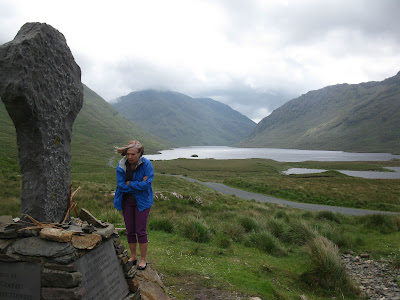Today, we drove south of Westport to show Paul and Carol the haunting and harsh beauty of the Sheeffry hills and Doolough (the black lake). When we had visited previously, I had written ..... "perhaps, the most spectacular inland drive we’ve taken during this
year’s holiday. The weather was by no means fair; we had very few clear
vistas. But you certainly understood the pull toward imbuing the land
with magic and mystery. High cliffs and mountains emerge from misty
clouds, bubbling waterfalls spring from stone, areas of light and dark
chase away as the sun plays behind the clouds. Several areas were quite
reminiscent of ancient Japanese rice paper paintings of mountains,
infinite shades of gray. Others were a riot of every possible shade of
green. And, on the way, majestic mountain lakes, large and small." I didn't know, however, the origin of the name Sheeffry (Cnoic Shiofra). It means "Hills of the Wraith." I sought a precise definition of the word wraith. It is "an apparition of a living person that appears as a portent just before that person's death." I have to say that I understand why ancient peoples might have seen such visions in these hills.
Especially given the history of the area: From Wikipedia -
"The Doolough Tragedy is an event that took place during the Great Irish Famine in south west County Mayo. On Friday 30 March 1849 two officials of the Westport Poor Law Union
arrived in Louisburgh to inspect those people in receipt of outdoor
relief in order to verify that they should continue to receive it.
For some reason the inspection did not take place and the officials went
on to Delphi Lodge – a hunting lodge – twelve miles south of
Louisburgh. The people who had gathered for the inspection were thus
instructed to appear at Delphi Lodge at 7am the following morning if
they wished to continue receiving relief. For much of the night and day
that followed therefore seemingly hundreds of destitute and starving
people had to undertake what for them, given their existing state of
debilitation, was an extremely fatiguing journey, in very bad weather.
A letter-writer to The Mayo Constitution reported shortly afterwards
that the bodies of seven people, including women and children, were
subsequently discovered on the roadside between Delphi and Louisburgh
overlooking the shores of Doolough lake and that nine more never reached
their homes. Local folklore maintains the total numbers that perished
because of the ordeals they had to endure was far higher." Unfortunately, many such senseless tragedies occurred during The Great Hunger. The memorial has an inscription from Mahatma Gandhi and Archbishop Desmond Tutu visited the area in 1994 to pay his respects to these poor souls.
 |
| The Famine Memorial |
 |
| White Strand |
 |
| The mist descends on the Sheeffry Hills |
 |
| Approaching Doolough |
 |
| On the way to Silver Strand |
 |
| Doolough is angry |
 |
| Silver Strand at the mouth of Killary Fjord |
 |
| Haunting Doolough |
|
|
|
 |
| By the Famine Memorial |









